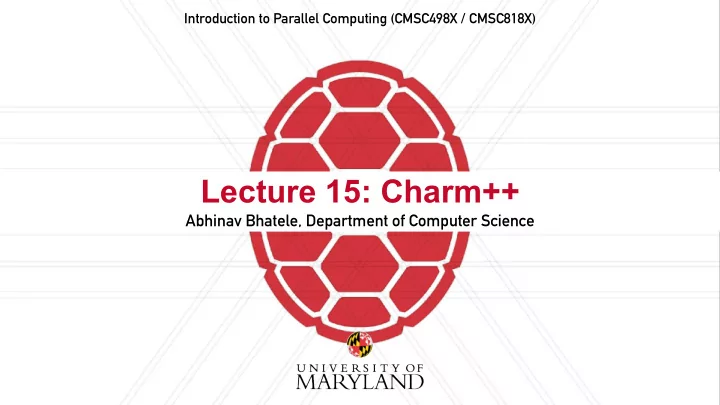

Introduction to Parallel Computing (CMSC498X / CMSC818X) Lecture 15: Charm++ Abhinav Bhatele, Department of Computer Science
Task-based programming models • Describe program / computation in terms of tasks • Tasks might be short-lived or persistent throughout program execution • Notable examples: Charm++, StarPU, HPX, Legion • Attempt at classification: https://link.springer.com/article/10.1007/s11227-018-2238-4 Abhinav Bhatele (CMSC498X/CMSC818X) LIVE RECORDING 2
Charm++: Key principles • Programmer decomposes data and work into objects (called chares ) • Decoupled from number of processes or cores • Runtime assigns objects to physical resources (cores and nodes) • Each object can only access its own data • Request data from other objects via remote method invocation: foo.get_data() • Asynchronous message-driven execution Abhinav Bhatele (CMSC498X/CMSC818X) LIVE RECORDING 3
Hello World in Charm++ mainmodule hello { array [1D] Hello { entry Hello(); entry void sayHi(); }; }; Charm++ Tutorial: http://charmplusplus.org/tutorial/ArrayHelloWorld.html Abhinav Bhatele (CMSC498X/CMSC818X) LIVE RECORDING 4
Hello World in Charm++ mainmodule hello { array [1D] Hello { entry Hello(); entry void sayHi(); }; }; void Hello ::sayHi() { CkPrintf("Hello from chare %d on processor %d.\n”, thisIndex, CkMyPe()); } Charm++ Tutorial: http://charmplusplus.org/tutorial/ArrayHelloWorld.html Abhinav Bhatele (CMSC498X/CMSC818X) LIVE RECORDING 4
Hello World in Charm++ mainmodule hello { Main::Main(CkArgMsg* msg) { numObjects = 5; // number of objects array [1D] Hello { entry Hello(); CProxy_Hello helloArray = entry void sayHi(); CProxy_Hello::ckNew(numObjects); }; helloArray.sayHi(); }; } void Hello ::sayHi() { CkPrintf("Hello from chare %d on processor %d.\n”, thisIndex, CkMyPe()); } Charm++ Tutorial: http://charmplusplus.org/tutorial/ArrayHelloWorld.html Abhinav Bhatele (CMSC498X/CMSC818X) LIVE RECORDING 4
Compiling a charm program • Charm translator for .ci file • Generates charm_hello.decl.h and charm_hello.def.h charmc hello.ci • C++ code: charmc -c hello.C charmc -o hello hello.o Abhinav Bhatele (CMSC498X/CMSC818X) LIVE RECORDING 5
Chare arrays • User can create indexed collection of data-driven objects CProxy_Hello helloArray = CProxy_Hello::ckNew(numElements); • Different kinds: 1D, 2D, 3D, … • Mapping of array elements (objects) to hardware resources handled by the runtime system (RTS) Abhinav Bhatele (CMSC498X/CMSC818X) LIVE RECORDING 6
Object-based virtualization • User programs in terms of chares or objects User View System View Abhinav Bhatele (CMSC498X/CMSC818X) LIVE RECORDING 7
Over-decomposition • Create lots of “small” objects per physical core • Objects grouped into arrays: 1D, 2D, … • System assigns objects to processors and can migrate objects between physical resources • Facilitates automatic load balancing Abhinav Bhatele (CMSC498X/CMSC818X) LIVE RECORDING 8
Message-driven execution • An object is scheduled by the runtime scheduler only when a message for it is received • Facilitates adaptive overlap of computation and communication Abhinav Bhatele (CMSC498X/CMSC818X) LIVE RECORDING 9
Cost of creating more objects? • Context switch overhead • Cache performance • Memory overhead • Fine-grained messages Abhinav Bhatele (CMSC498X/CMSC818X) LIVE RECORDING 10
Abhinav Bhatele 5218 Brendan Iribe Center (IRB) / College Park, MD 20742 phone: 301.405.4507 / e-mail: bhatele@cs.umd.edu
Recommend
More recommend